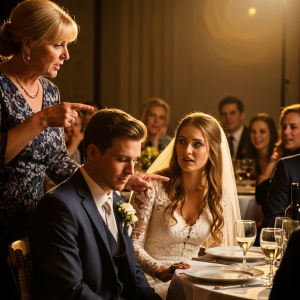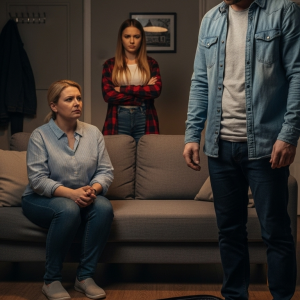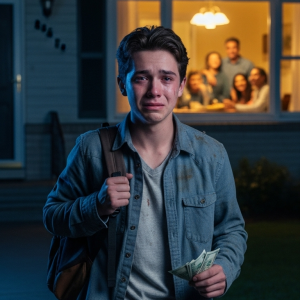I’ve been sitting on this story for years, and honestly, I’m only sharing it now because I finally got my revenge and need to tell someone. So, buckle up, because this is wild.
It starts when I was eight, and my mom married Brad. He brought his six-year-old twins into the family, and for a few years, things were fine. Brad always made it clear his kids came first, but I was used to feeling like an afterthought. My biological dad wasn’t in the picture—or so I thought. Mom always called him a “deadbeat,” said he ran off with some woman from his office when I was three.
Things started to change when I hit middle school. The favoritism became more blatant. The twins got new phones; I got hand-me-downs. They got to pick the restaurants; I was told to just “find something on the menu.” It was a slow drip of small resentments that built up over time. But the real turning point was the summer before high school. I was fourteen.
My mom and Brad were planning a big vacation. I overheard them one night in the living room. Brad’s voice, thick with alcohol, carried through the house. “Why waste three thousand dollars on him?” he slurred, and I froze, my hand hovering over the refrigerator door. “My kids deserve better. We could upgrade our cabin with that money.”
Then I heard my mother’s voice, my actual mother, reply, “You’re right. He’s just like his deadbeat father anyway. He probably wouldn’t appreciate it.”
Something inside me snapped. I walked into the living room. They were huddled over a laptop, looking at a fancy Mediterranean cruise. “So,” I asked, my voice trembling, “when were you going to tell me I’m not invited to the ‘family’ vacation?”
Mom looked like she’d seen a ghost. Brad just looked angry, like I’d interrupted his sacred drinking time. “These are adult decisions, Michael,” he started, but I cut him off.
“You called me a name,” I said, my voice barely a whisper. “I heard you.”
Brad shot up from the couch, grabbing my arm with a grip that bruised. “You want to know why? Because you’re not my son. You’re nothing to me. Just some burden I’ve been carrying because of your mother.”
I looked at my mom, my eyes pleading for her to say something, to defend me. She just sat there, her face a mask of cold indifference. Then Brad shoved me, and I stumbled into a shelf. As I tried to get past him, he grabbed my laptop from the counter—the one I’d saved up for for months—and threw it against the wall. The screen shattered.
Mom finally stood up, but not to help. “I’ve given you everything,” she said, her voice dripping with disdain, “and you’re still ungrateful. Just like your father.”
That night, I locked myself in my room and packed. I cried until I had no tears left. When I came home from school the next day, the locks were changed. All my belongings were in garbage bags on the front lawn, some of them torn open, my clothes and books scattered across the wet grass. Our neighbor, Mrs. Larson, told me she’d seen Brad throwing my stuff out, laughing as he did it.
I was fourteen years old and homeless. My friend Jake’s mom came and picked me up, her face a mask of fury when I told her what had happened. For the next two weeks, my mom and Brad posted daily pictures from their cruise. “Our real family, finally,” one caption read. They were celebrating getting rid of me.
It was while sorting through my ruined belongings that I found it: an envelope wedged inside my old yearbook. Inside were eleven birthday cards, one for every year since I was three, all from my “deadbeat” father. Every single one had been returned, unopened, with “Return to Sender” written in my mom’s handwriting. There was also a letter, dated from when I was four, begging my mom to let him see me, with a canceled check for child support attached.
That’s when I knew. Everything she had ever told me was a lie.
Jake’s parents were my saving grace. Mr. Reynolds, his dad, wanted to call Child Protective Services immediately, but I was terrified of the foster care system. Instead, Mrs. Reynolds called the school, and then, with me sitting beside her, she called the number on the most recent birthday card.
A man’s voice, so normal-sounding, answered. When Mrs. Reynolds explained who she was and that I was with her, there was a long, choked silence. Then, he whispered, “Michael? You found Michael?”
This man, the man I’d been taught to hate, sounded like he was about to cry just hearing my name.
His name was David, and he flew out the next day. He told me everything. My mother had left him, taking me and disappearing while he was on a business trip. She’d met Brad and decided to “upgrade.” He had hired a private investigator, sent letters, paid child support into an account she’d emptied—he had never stopped looking for me.
A week later, a judge granted him emergency custody. Meeting him was surreal. We looked exactly alike. He didn’t try to force a connection, just said he’d missed eleven years and wanted to make up for it, if I’d let him. That first night, he showed me pictures of a family I never knew I had. Then he asked if I wanted to come live with him in Seattle. I said yes without a moment’s hesitation.
The day before we were set to leave, my mother showed up at Jake’s house, a vision of fake tears and manufactured regret. Brad’s business was failing, and suddenly, she’d made a “terrible mistake.” Mrs. Reynolds wouldn’t even let her in the door. Then my dad pulled up. The color drained from my mother’s face. “David? What are you doing here?” she stammered.
He just looked at her, his expression unreadable, and said, “I’m taking my son home.”
She started screaming about how he’d abandoned us, but he just pulled out his phone and played a voicemail she’d left him years ago—a cruel, gloating message about how he’d never find us. I watched from the window as she tried to slap the phone out of his hand, her perfect facade crumbling into raw, ugly desperation. For the first time, I saw her for what she was: a selfish person who’d thrown away her child for a man who turned out to be a bad bet.
We moved to Seattle the next day. It wasn’t easy, but it was a new beginning. My dad was patient, kind, and unwavering in his support. He never spoke ill of my mother; he just focused on helping me heal. I was angry for a long time, but with his help, I channeled that rage into something productive. I excelled in school, got into a good university, and started to build a life I could be proud of.
Years passed. I graduated and started my own small investment consulting business. Then, I got a message on social media from a man named Alan, claiming to be Brad’s business partner. He told me that Brad’s company was on the verge of collapse and that Brad had been using me as an excuse, telling investors he’d spent hundreds of thousands supporting his “worthless, runaway stepson.” The old anger, which I thought had faded, came roaring back. And that’s when the seed of my revenge plan first took root.
I told Alan I might know some investors, and he, desperate to save the company, sent me everything: their financials, business plans, a detailed look at the mess Brad had created. The company wasn’t worthless; it had just been run into the ground by a man who valued appearances over competence.
I created a shell company: Phoenix Ventures. I hired a sharp colleague, Jasmine, to be its public face. She approached Brad and my mother as a potential investor, dangling a lifeline they couldn’t resist. They were desperate, and she was their salvation.
The terms of the investment were simple, and a hundred percent legal. Phoenix Ventures would provide the capital to save the company. In return, Brad and my mother would have to personally guarantee the investment with everything they owned—their house, their cars, their retirement accounts. The contract included performance targets, benchmarks I knew, from looking at their financials, were impossible for them to meet. When they failed, Phoenix Ventures would own everything.
They fell for it completely, too blinded by greed and desperation to read the fine print.
The night before they signed the final contracts, I couldn’t sleep. I kept thinking about that fourteen-year-old kid standing in front of his belongings in garbage bags. I thought about their smiling cruise photos. I thought about the words “our real family.”
The next morning, I watched a live feed from a hidden camera in the conference room. I saw Brad’s smug face as he signed away his future, not even bothering to read what he was signing. When the last signature was in place, I sent Jasmine a text: Now.
She excused herself to “make a call to the investment committee.” Five minutes later, she returned and placed a single folder on the table. I couldn’t hear what she said, but I saw the color drain from Brad’s face as he opened it. Inside was a photo of me, along with documentation of every lie he’d ever told.
That’s when my phone started blowing up. Sixty missed calls. Voicemails filled with pure terror. They had finally realized who they were in business with.
I made them wait. For three hours, I let their frantic calls go to voicemail while I went out for coffee. Then, I went to my office and told my receptionist to send them in when they arrived.
When they walked in, they looked broken. My mother, who had once prided herself on her designer purses and salon-perfect hair, looked small and worn. Brad, stripped of his usual bluster, just looked old. It took my mother a full ten seconds to even recognize me.
“Michael?” she whispered, stumbling backward.
Brad’s confusion turned to rage. “You! This is fraud! I’ll sue you!”
I leaned back in my chair. “Sit down,” I said, my voice cold and steady. “Everything you signed is one hundred percent legal. I simply offered you an investment opportunity, and you accepted. It’s not my fault you didn’t read the fine print.”
My mother started to cry, the same manipulative tears she’d used for years. “How could you do this to us?”
I pulled out my phone and showed her the screenshot I’d saved from their cruise all those years ago. “Our real family finally.”
“How could you abandon a fourteen-year-old and then post this for the world to see?” I asked.
Brad tried to change his tactics, offering to “make things right” if I’d tear up the contract. “We can be a family again,” he pleaded.
“Do you remember throwing my laptop against the wall?” I asked. “Do you remember telling me I was nothing to you?”
He mumbled something about stress and making mistakes. The usual excuses.
I laid out their options. They could try to meet the impossible performance targets and lose everything. Or, they could sign over the company and the house to me right now, and I’d let them keep their personal belongings and one car.
My mother looked at Brad, all the fight gone from her eyes. She knew they were trapped. She asked for a pen.
By six o’clock that evening, I legally owned their company and their house. I gave them forty-eight hours to clear out. As they were leaving, Brad turned and spat at me. He missed. My mother just kept walking, not even looking back.
I sold the house. I donated half the money to a charity for abandoned teens and used the other half to take my real family—my dad, his wonderful wife Diane, and their kids—on a Mediterranean cruise. I posted plenty of pictures.
I heard through the grapevine that Brad and my mother are living in a small apartment in another state. She’s a waitress; he’s working at a hardware store. Sometimes I check their social media, which has gone completely silent.
My dad says I should let the anger go now, that it only hurts me. He’s probably right. But every time I think about how they threw me away like garbage, I don’t regret a thing. They made me nothing to them. So, I made them nothing to the world. They signed every document. They gambled everything on a get-rich-quick scheme. All I did was let them fail on their own terms. Some people might say I went too far. Maybe. But when you abandon your kid, don’t be surprised when he grows up and proves just how wrong you were.
rad’s face was turning an ugly shade of red, the kind of blotchy, high-blood-pressure flush that made me wonder if he’d keel over right there in my office. His hands were balled into fists, knuckles pale. My mother sat rigid, her hands folded in her lap, eyes darting between me and the thick contract sitting in front of her like it was a loaded gun.
“You think this is funny?” Brad growled, his voice low but shaking. “You… you’ve been planning this?”
I leaned forward, elbows on the desk, and locked eyes with him. “Planning?” I let the word hang in the air for a beat. “Brad, I’ve been waiting for this. Since I was fourteen. Since the day you and my mother decided your vacation photos were more important than your own kid. Since the day you threw my life into garbage bags and dumped them on the lawn like trash.”
My mother winced, her perfectly rehearsed victim act slipping for just a moment. “We were under pressure back then—” she started.
“Don’t,” I cut in sharply, holding up a hand. “Don’t rewrite history. You weren’t under pressure. You were selfish. You were cruel. And you made it very clear that I wasn’t part of your family. Those words you posted—‘our real family’—I’ve got them burned into my memory.”
Brad slammed his palm on my desk. “You ungrateful little—”
“Sit down,” I said, my voice like ice. He froze, probably realizing this wasn’t the fourteen-year-old kid he could shove around anymore. Slowly, he lowered himself back into the chair.
“You know what the funny part is?” I continued, leaning back. “I didn’t need to do this. I could’ve ignored you both forever and lived my life in peace. But then I heard about the lies. The sob stories you fed to investors, blaming your failures on me—on the kid you abandoned. That’s when I decided I wasn’t just going to walk away. I was going to take everything you cared about. And now I have.”
My mother’s voice cracked. “Michael, we’re your family—”
“Family?” I laughed, the sound sharp. “You gave up the right to use that word with me the moment you chose Brad’s ego over your own son’s well-being. The moment you turned your back while he called me nothing. The moment you decided my place in your life was outside, in the rain, with my belongings in trash bags.”
Brad sneered. “So, what? You get off on this? You think taking our house, our company, makes you the bigger man?”
I met his gaze evenly. “No, Brad. Being the bigger man would’ve been walking away. This?” I gestured to the signed contracts. “This is justice.”
For a moment, the room was silent except for the ticking of the clock on my wall. Brad’s breathing was ragged; my mother’s hands were trembling. I wanted them to feel it—the weight of their own decisions crushing them.
“Here are your options,” I said finally, sliding two folders across the desk. “Option one: you try to meet the performance targets in the contract you signed. You won’t, but you can try. Option two: you sign over the company and the house right now, and I’ll let you keep one car and your personal belongings. You have two minutes to decide.”
Brad stared at the folders like they were poisonous. My mother’s eyes glistened, but she wasn’t crying for me—she was crying for herself.
“This is extortion,” Brad spat.
“This is a legally binding contract,” I corrected. “You signed it in front of witnesses. If you want to test it in court, go ahead. I can afford the best attorneys in the state. Can you?”
My mother’s voice was barely above a whisper. “Michael… please.”
“Please what?” I asked. “Please forget the years you ignored me? Please pretend the bruises didn’t happen? Please overlook the fact that you kept me from my real father because it was more convenient for you?”
Her lip trembled. Brad looked at her, then at me, then back at her. “Sign it,” he muttered.
She flinched. “What?”
“Sign the damn paper,” he said, his voice tight with rage. “We can’t win this.”
She reached for the pen with a shaking hand. I watched her scrawl her name across the page, her signature looping and uneven. Brad snatched the pen from her and slammed his name down in blocky, angry letters.
When they pushed the papers back toward me, I didn’t touch them right away. I just looked at them—two people who had once held absolute power over me, now stripped of everything they thought made them untouchable.
“Forty-eight hours,” I said finally, standing. “That’s how long you have to vacate the house. After that, you’re trespassing.”
Brad stood too, towering over me, his jaw clenched so tight I could hear the grind of his teeth. “You think you’ve won, kid? You’ve just made enemies.”
I smiled. “Brad, you were never my enemy. You were an obstacle. And now? You’re just irrelevant.”
They left without another word, slamming my office door so hard the glass rattled. I sat back down, the contracts in front of me, and let out a slow breath. My hands were steady. No adrenaline shakes, no doubt creeping in. Just a cold, calm certainty.
That night, I drove past their house. Lights were still on, but through the window, I could see them—Brad pacing, my mother sitting on the couch with her head in her hands. I didn’t feel pity. I felt… closure.
Two days later, they were gone. The house was empty, the keys left in the mailbox. I walked through every room, taking in the smell of expensive candles and the faint traces of their life. Then I called a realtor.
The sale went through faster than I expected. I took half the profit and donated it to a youth shelter that specialized in helping kids who’d been kicked out of their homes. The other half? I booked a Mediterranean cruise. This time, it was with people who actually deserved to be called family—my dad, Diane, and my half-siblings. We took photos. We laughed. We lived.
And when I posted them, I used their exact words: “Our real family, finally.”




